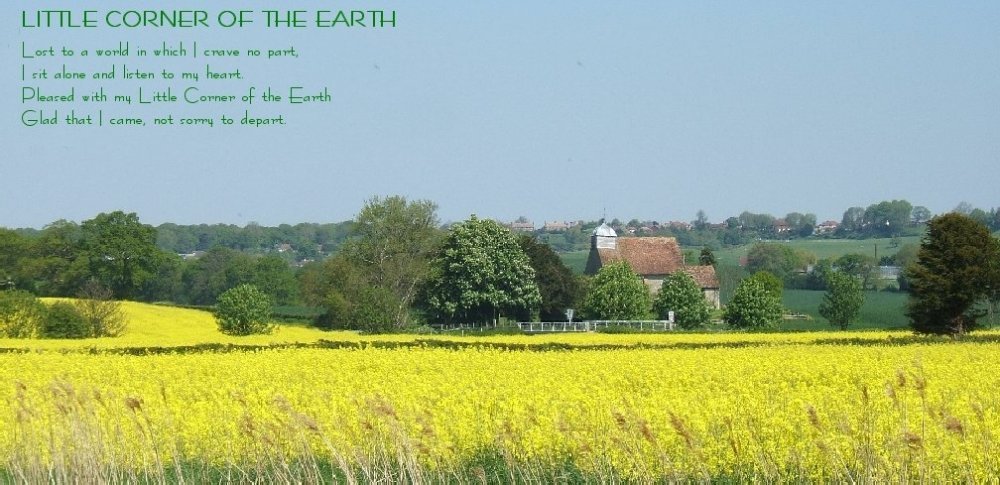The forecast was "warm with a light breeze". It was a bright September morning. Autumn fruits were in abundance
As a warm-up I cycled to my morning coffee break (A garden centre in the hamlet of Reading Street). Good coffee (free refills), toasted teacake and blackcurrant jam. Then a gentle freewheel down the little lane that once led to a busy landing place on the River Rother. Mediaeval sailing ships once traded here and a series of ancient, prosperous houses line the lane. This one, dreaming behind its sere fencing, was once the harbour master's house:
However, in the 17th century a great storm diverted the river's main course; the harbour had to be abandoned and all that now remains of the river here is a country stream.
After this some low gear work was called for as I cycled up an escarpment onto what was once an island. A breather was called for
The curiously named locality (village long since disappeared) derives from the Saxon "Ebun's ie" (the island owned by Ebun) . You will note my stragically placed coffee flask, for later use.
A gentle climb brings us to the summit of the "island" and the village of Wittersham
The Viking ship on the village sign reminds us that all this area was subjected to Danish raiding parties in the 9th/10th centuries.Here I stopped to consult my map. I could see an interesting route would follow a road, then a farm track and then a bridle path going South towards Rye. The track went through the grounds of a stately home and the bridle path crossed a small river, but, what the hell, let's give it a go. So, inspired by the button badge on my saddlebag (a present from Herhimnbryn), I set off.
The road was swallowed by the gates of the statelyhome, with a notice saying "private drive". A cycle is an ideal way of traversing such a road - silence and celerity! We whisked through without disturbing His Lordship and out onto the farm track the other side. I was encouraged by the sign on the farm gate - the man must have a sense of humour
A couple of miles of rocky farm track followed and then the road petered out descending like a rabbit hole into a single pathway through the trees. This was mountain bike country, but I was tackling much worse than this on normal road lightweight bikes before they were even thought of (we called it "roughstuffing" and didn't know that you needed a special bike for it).
Eventually I broke through the trees and descended into the wide valley of the little River Tillingham, pushed the bike over a little footbridge and toiled up the other side of the valley.
(Down the hill by the finger of trees and over the footbridge by the pylon)
Let's have a look back over the vast valley - how could such a tiny river have carved it out? The answer lies some 10,000 years ago when the glaciers of our last ice age melted and mighty torrents of water roared down from the hinterland rolling rocks and debris before them.
It was time to take on fuel - elevenses having long been burnt up. Heavy meals don't suit me when cycling (a full stomach gets in the way when bending over dropped handlebars). So a couple of fried eggs ("easy over" for you American readers) with two slices of toast made from locally baked brown bread - plus a large pot of tea - topped me up nicely.
I crossed over the River Rother Bridge out of Rye (the following picture shows why these places are no longer ports - in a word "mud" - silt brought down in quantities for the Wealden clays)
I was now on the levels of Romney Marsh and decided to follow the cycle track which paralleled the road for some 9 miles towards the town of Lydd. At the outset of this screed I mentioned that the forecast was for "light breezes" - Hell! it was like cycling into a solid wall of air, with head wind at about 25 mph. (whilst The Marsh is pleasant cycling on calm days - no hills , it can be savagely windswept at times). This pleasant path-side scene belies the air whistling by my head at the time.

And so at last to Lydd - it's name sounds Welsh (but is Saxon). In fact it could hardly be farther from Wales, being the most southeastern town in Britain. I say town, but really a large village.
D'you see the whitewashed shop by the church? Well I decided I deserved a treat. I sat behind a church buttress, warm to my back, in the sun and out of the wind and indulged!
After that, the push for home - however there was another stop on the way - a church I had not visited before (I feel that Larkin's poem "Church Going" sort of sums my travels up beautifully)
Once I am sure there’s nothing going on
I step inside, letting the door thud shut.
Another church: matting, seats and stone,
And little books; sprawlings of flowers, cut
For Sunday, brownish now: some brass and stuff
Up at the holy end; the small neat organ;
And a tense, musty, unignorable silence,
Brewed God knows how long. Hatless, I take off
My cycle clips in awkward reverence…………..
I step inside, letting the door thud shut.
Another church: matting, seats and stone,
And little books; sprawlings of flowers, cut
For Sunday, brownish now: some brass and stuff
Up at the holy end; the small neat organ;
And a tense, musty, unignorable silence,
Brewed God knows how long. Hatless, I take off
My cycle clips in awkward reverence…………..
This is the church of St Mary the Virgin in the aptly named Marsh village of St Mary-in-the-Marsh
I'm glad I went in - for those of us who have a "handkerchief moment" at the "Daddy, my Daddy" scene in the film "The Railway Children" it will have special significance - the author Edith M Nesbit lived happily in the village with her second husband, "The Skipper" and is buried here. She required that no stone be erected on her grave so her husband carved a wooden marker over it - it is under the oak tree to the right of the churchyard.




Looking at the map, the direct route home would have brought me up to about 45 miles. "Why not make it the round 50?", I thought. So I braved the wind and put in a loop which had me finishing my flask of coffee, sitting in the late afternoon sun at my favourite stopping place.
And the final mileage? - 51.6 (82 km for those of you with a less "Imperial" bent!) and in spite of the wind a very pleasant day (would you believe that the following day there was not a breath of air - sod's law!)




















